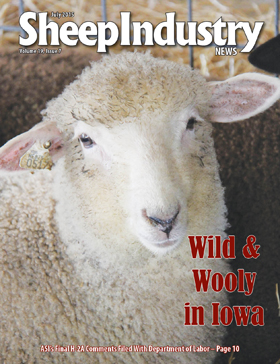Legislative News in Brief
House Passes Mandatory Price Reporting
The full U.S. House of Representatives on June 9 passed by a voice vote the Mandatory Price Reporting Act.
House Agriculture Committee Chairman Michael Conaway (Texas) said his first goal as chairman was to have all reauthorizations complete before the deadlines passed this fall. “This completes our work in cleaning up the books of the House Agriculture Committee, addressing every item on the Congressional Budget Office’s (CBO) list of unauthorized appropriations under the committee’s jurisdiction.”
The Mandatory Price Reporting Act, HR 2051, which is designed to reflect what’s happening in the industry and bring fairness to the market, must be reauthorized every five years. The latest reauthorization was set to expire on Sept. 30, 2015.
For the first time, the reauthorization contained statutory language on lamb in order to direct action on the thresholds of lamb processing and importing companies to help ensure information is available for publication every week.
As American Sheep Industry Association President Burton Pfliger (N.D.) testified, “Lapses in price reporting created difficulties for the entire industry from farmers to feeders to meat companies.
“The sheep industry appreciates the inclusion of statutory language for lamb that increase the number of firms reporting both American lamb and imported lamb pricing. The updated legislation is crucial to keep market reporting available for the lamb industry in order to keep pace with changes in the lamb business.”
Alternative Allotments in Bighorn Areas?
Intermountain Region, Regional Forester Nora B. Rasure communicated with Govs. Brian Sandoval (Nev.), Matthew Mead (Wyo.) and Butch Otter (Idaho), Utah’s Director of Public Lands Policy Coordinating Office Kathleen Clarke and National Forest System permittees regarding the maintenance of domestic sheep grazing on public lands and the conservation of bighorn sheep.
In the letter to permittees, Rasure explains that the Intermountain Region Forest Service is preparing a bighorn sheep risk assessment for each of the national forests to identify possible contact between domestic and bighorn sheep on the national forest. “I want to emphasize that the risk assessment is not a decision-making process. We have not made any decisions about changing or adjusting domestic sheep grazing allotments,” Rasure wrote.
“In areas where a high probability of contact exists, affected permittees and other stakeholders will be engaged in an open and transparent process to discuss potential solutions. This could include application of best management practices to maintain species separation or search for alternative allotments. We have developed a regional list of vacant allotments that can be considered in this discussion,” continued Rasure.
“While disappointing the regional agency is continuing to implement their bighorn management, the mention of vacant allotments is perhaps evidence the dozens of members of Congress working with our industry on this issue are having an impact” said Peter Orwick, executive director for the American Sheep Industry Association. “The sheep industry has requested vacant allotment inventory for years and this is the first provided, however there is no requirement alternatives be provided to ranchers that will no doubt lose significant share of their sheep grazing so our legislative drive to mandate such is still critical.”
The letters to Utah officials focused as well on the reaction of sheep ranchers to meetings this spring, which relayed several allotments that would be withdrawn in 2017 or days of grazing cut in half or more. The input of sheep industry participants is characterized as nonexistent to this point.
The letters and legislative documents to require federal agencies to offer compatible grazing allotments to sheep producers prior to loss of existing grazing due to bighorn sheep management can be found at www.sheepusa.org legislative action center.
Sheep Industry Retains COOL
The House of Representatives on June 10 voted on the Country of Origin Labeling Amendments Act of 2015 (H.R. 2393), which repeals COOL for beef, pork and poultry while leaving the requirements in place for lamb.
The American Sheep Industry Association recognized House Agriculture Committee chair Mike Conaway (Texas) for his leadership of the legislation that allows the labeling of lamb to continue.
“In contrast to the beef, pork and poultry industries, sheep from other countries are not generally slaughtered in the United States, alleviating much of the controversy around labeling,” said ASI Executive Director Peter Orwick. “Additionally, sheep producers provide a unified message supporting labeling and we appreciate the chairman’s recognition of this fact by securing legislation that maintains COOL for lamb.”
ASI policy has strongly supported the required identification of lamb for nearly 25 years and lamb-promotion organizations have emphasized American lamb in national advertising since the 1960’s.
Ag Gets Hours of Service Rule Waiver
America’s farmers have been granted a two-year waiver from the U.S. Department of Transportation’s hours-of-service rule for certain drivers.
The rule, issued in mid-2013 by DOT’s Federal Motor Carrier Safety Administration, required truck drivers to take a 30-minute rest break for every eight hours of service. It would have prohibited drivers hauling livestock from caring for animals during the rest period.
In 2013, livestock, poultry and food organizations petitioned the FMCSA for a waiver and were granted an exemption from complying with the regulation. A request was again made this April by the American Sheep Industry Association and the coalition, asking the FMCSA to renew the waiver and to extend it for the two-year maximum allowable under federal law.


